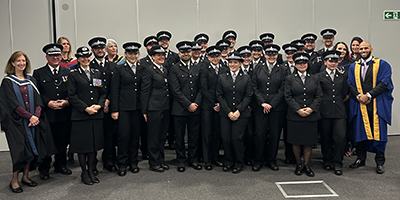Employer webinar on demand: Skills for life – How apprenticeships can enable career changers
It’s a challenging skills landscape in the UK, with widespread and ongoing shortages. Almost three quarters (73%) of businesses polled in The Open University’s (OU) latest Business Barometer report said they had significant skills gaps and that it was affecting their ability to do business.
Apprenticeships are a very effective way of plugging skills gaps and boosting talent pipelines and they are under the spotlight this week due to it being National Apprenticeship Week in England. To mark it, the OU produced a webinar called Skills for life – How apprenticeships can enable career changers in conjunction with earn and learn employer movement, The 5% Club.
Watch now
Find out how we can help your organisation
Please contact us to find out more about ways in which we can support you with your learning and development requirements.
Phil Kenmore, Director of Corporate Development and Partnerships at the OU, and Gill Cronin, Director of Operations at The 5% Club, co-hosted the webinar.
The world is a very fast-moving place and giving people an opportunity through ‘earn and learn’ to stay relevant, to stay up to date, have portable skills, is I think, just key.
Gill Cronin, Director of Operations at The 5% Club
Director of Operations at The 5% Club
Phil and Gill were joined on the webinar by panellists Kate Dennis, Talent Development Partner at enableNY, representing North Yorkshire Police (NYP) and North Yorkshire Fire and Rescue, and Jagdeep Soor, Head of Strategic Partnerships at the Multicultural Apprenticeship Alliance.
A strategic approach
Early on in the webinar, Gill posed the question: “Why is it important to address these issues strategically?”
Phil’s response was that strategic workforce planning enables employers to anticipate and meet future needs. “You’ve got to plan ahead for skills gaps. It can take time to attract different talent pools and then build a pipeline of talent through the organisation. If you’re not doing that strategic planning, then it’s going to be really difficult to attract and retain talent.”
Organisations increasingly recognise the importance of developing talent from within, via training such as apprenticeships, in order to address skills challenges. This approach takes time, commitment and strategic planning, but Kate said that the results are worth it. NYP recently celebrated the graduation of its first cohort of Police Constable Degree Apprentices, a programme run in partnership with the OU. Learners include a number of career changers from a variety of backgrounds, utilising all of its apprenticeship levy in the process.
They all study towards degree level and gain valuable leadership skills, which means we are also developing our leaders of the future.
Kate Dennis
Talent Development Partner at enableNY
NYP is also running a Police Community Support Officer Apprenticeship with the OU and is very proud of its two new pathways for progression and career development. Kate says another great benefit of these apprenticeships is that the learners bring new ideas and approaches to the service.
Enabling diversity
Jagdeep agreed that apprenticeships are a great way of increasing diversity of thinking in organisations, particularly when employers use them strategically, as a way to tap into a more diverse talent pool.
A diverse workforce brings a variety of perspectives and ideas which can be beneficial for the business and industry. Apprenticeships focus on skill development, allowing individuals from diverse backgrounds to acquire specific skills needed for the particular job.
Jagdeep Soor
Head of Strategic Partnerships at the Multicultural Apprenticeship Alliance
The practical, on-the-job training provided by apprenticeships works really well for people who want to move into a new career, but lack sector-specific skills. Through apprenticeships, they gain those valuable skills, while still working and earning.
Success stories
As well as policing, Phil said the health and social care sectors have really benefited from apprenticeship partnerships, broadening access to learning and drawing in more career changers.
We have a lot of people doing apprenticeships in nursing and social work and we see where they [organisations] recruit from local communities, they can gain a very diverse talent pool.
Phil Kenmore
Director of Corporate Development and Partnerships at the OU
With the OU’s flexible, online learning reducing barriers such as travel time and work and personal commitments, employers also report very high levels of commitment and motivation from apprentices, as they really value the opportunity to learn new skills and gain entry into a new career, while also earning a salary at the same time.


